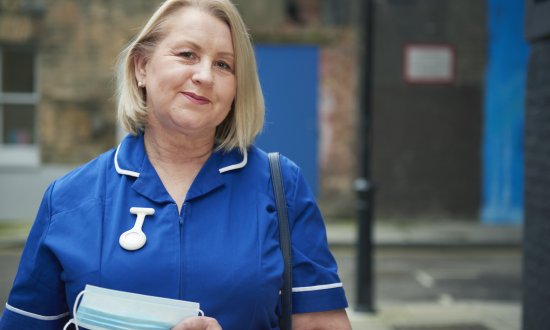Nurses and midwives forever altered by Covid-19 pandemic
Nurses and midwives feel ‘forever altered’ by the impact of Covid-19 and remain deeply affected by what they experienced, new research from the University of Surrey reports. None felt they came through the last two years unscathed.

Researchers say that there is an urgent need to tackle stigma to create a psychologically safe working environment and have called for a national Covid-19 nursing workforce recovery strategy to retain nurses and help restore their psychological well-being.
Jill Maben, Professor of Health Services Research and Nursing at the University of Surrey, said:
“Nurses and midwives put their own health and psychological wellbeing on the line for the public during the pandemic and many unfortunately lost their lives. Others experienced burnout, high levels of moral distress and PTSD. We have a duty as a society to take care of frontline staff who experienced such extreme psychological and emotional distress during this pandemic.
“To prevent a mass exodus of our nursing and midwifery workforce, it is important that they are offered the care and support that they need. A new national strategy focussing on their wellbeing is essential. The support currently offered is a good start in improving wellbeing, however more needs to be done at organisational levels (not just letting the responsibility rest with the individual nurse or midwife) as a one size fits all approach does not work.”
The findings are published in the International Journal of Nursing Studies, as part of the ongoing Impact of Covid on Nurses (ICON) longitudinal interview study which arose from the ICON survey, researchers examined the impacts of the pandemic on frontline nursing staff’s psychological and emotional wellbeing during the second wave of the Covid-19 pandemic.
Interviewing nurses and midwives from across the country, researchers identified high levels of distress amongst participants about the lack of compassionate care they were able to offer patients during this time.
One nurse, spoke about her distress and embarrassment about the care her patients received whilst she was redeployed, and her hope that investigations would be launched into patient care after the pandemic.
Redeployment was also found to have caused trauma to nurses, with many being unaccustomed to caring for high numbers of critically ill patients and being witness to such high numbers of patient deaths. A lack of trust between existing and redeployed nurses was also identified with many experiencing distress when forced to carry out tasks that they felt insufficiently trained to do and were concerned that their professional registration may be endangered.
Stigma was a factor in some nursing staff not accessing counselling services during the first wave of the pandemic. Some participants referred to the notion that nurses seeking counselling would be viewed as a ‘sign of weakness.’ Those who did seek out counselling often did so through anonymous sources such as charities or Trade Unions suggesting a lack of trust in the confidentiality of resources offered by employers.
Professor Maben added:
“These interviews were some of the most challenging of my career. We felt immensely privileged as a research team to bear witness to the selflessness and skilful work of nurses and midwives during the pandemic, while also hearing their often harrowing stories. We were often in awe of their work and felt their stress and distress deeply. However, interviewees suggested that by listening to their stories we provided some therapeutic space and comfort, with many very grateful that we were undertaking this work and recording their experiences for posterity.”
ICON project team members included Dr Anna Conolly and Dr Ruth Abrams for the University of Surrey, Professor Ruth Harris and Dr Emma Rowland from Kings College London, Dr Keith Couper at the University of Warwick, Professor Danny Kelly from Cardiff University and Dr Bridie Kent from the University of Plymouth.
The team is also grateful to the Colt Foundation the Burdett Trust and the Florence Nightingale Foundation for their support with this project.
Notes to editors
Professor Jill Maben is available for interview
For further information please email mediarelations@surrey.ac.uk
Media Contacts
External Communications and PR team
Phone: +44 (0)1483 684380 / 688914 / 684378
Email: mediarelations@surrey.ac.uk
Out of hours: +44 (0)7773 479911
